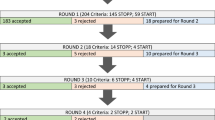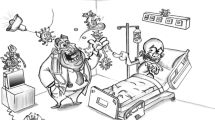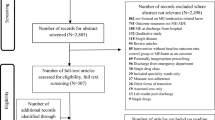Abstract
Background Medication errors are the most common types of medical errors that occur in health care organisations; however, these errors are largely underreported. Objective This study assessed knowledge on medication error reporting, perceived barriers to reporting medication errors, motivations for reporting medication errors and medication error reporting practices among various health care practitioners working at primary care clinics. Setting This study was conducted in 27 primary care clinics in Malaysia. Methods A self-administered survey was distributed to family medicine specialists, doctors, pharmacists, pharmacist assistants, nurses and assistant medical officers. Main outcome measures Health care practitioners’ knowledge, perceived barriers and motivations for reporting medication errors. Results Of all respondents (N = 376), nurses represented 31.9% (n = 120), followed by doctors (n = 87, 23.1%), pharmacists (n = 63, 16.8%), assistant medical officers (n = 53, 14.1%), pharmacist assistants (n = 46, 12.2%) and family medicine specialists (n = 7, 1.9%). Of the survey respondents who had experience reporting medication errors, 56% (n = 62) had submitted medication error reports in the preceding 12 months. Results showed that 41.2% (n = 155) of respondents were classified as having good knowledge on medication error and medication error reporting. The mean score of knowledge was significantly higher among prescribers and pharmacists than nurses, pharmacist assistants and assistant medical officers (p < 0.05). A heavy workload was the key barrier for both nurses and assistant medical officers, while time constraints prevented pharmacists from reporting medication errors. Family medicine specialists were mainly unsure about the reporting process. On the other hand, doctors and pharmacist assistants did not report primarily because they were unaware medication errors had occurred. Both family medicine specialists and pharmacist assistants identified patient harm as a motivation to report an error. Doctors and nurses indicated that they would report if they thought reporting could improve the current practices. Assistant medical officers reported that anonymous reporting would encourage them to submit a report. Pharmacists would report if they have enough time to do so. Conclusion Policy makers should consider using the information on identified barriers and facilitators to reporting medication errors in this study to improve the reporting system to reduce under-reported medication errors in primary care.
Similar content being viewed by others
References
NCCMERP. The National Coordinating Council for Medication Error Reporting and Prevention NCC MERP : The First Ten Years " Defining the Problem and Developing Solutions ". 2005.
Leistikow I, Mulder S, Vesseur J, Robben P. Learning from incidents in healthcare: the journey, not the arrival, matters. BMJ Qual Saf. 2017;26:252–6.
Mitchell I, Schuster A, Smith K, Pronovost P, Wu A. Patient safety reporting : a qualitative study of thoughts and perceptions of experts 15 years after ‘ To Err is Human’. BMJ Qual Saf. 2016;25:92–9.
Yung H, Yu S, Chu C, Hou I, Tang F. Nurses’ attitudes and perceived barriers to the reporting of medication administration errors. J Nurs Manag. 2016;24:580–8.
Abualrub RF, Al-akour NA, Alatari NH. Perceptions of reporting practices and barriers to reporting incidents among registered nurses and physicians in accredited and nonaccredited Jordanian hospitals. J Clin Nurs. 2015;24:2973–82.
Rashed A, Hamdan M. Physicians’ and nurses’ perceptions of and attitudes toward incident reporting in Palestinian Hospitals. J Patient Saf. 2015;00:1–6.
Bayazidi S, Zarezadeh Y, Parvan K. Medication error reporting rate and its barriers and facilitators among nurses. J Caring Sci. 2012;1:231–6.
Hartnell N, MacKinnon N, Sketris I, Fleming M. Identifying, understanding and overcoming barriers to medication error reporting in hospitals: A focus group study. BMJ Qual Saf. 2012;21:361–8.
Alqubaisi M, Tonna A, Strath A, Stewart D. Exploring behavioural determinants relating to health professional reporting of medication errors: a qualitative study using the Theoretical Domains Framework. Eur J Clin Pharmacol. 2016;72:887–95.
Escoto KH, Karsh B-T, Beasley JW. Multiple user considerations and their implications in medical error reporting system design. Hum Factors. 2006;48:48–58.
Hickner J, Zafar A, Kuo GM, Fagnan LJ, Forjuoh SN, Stevens BK, et al. Field test results of a new ambulatory care medication error and adverse drug event reporting- MEADERS. Ann Fam Med. 2010;8:517–25.
Rea D, Griffiths S. Patient safety in primary care: incident reporting and significant event reviews in British general practice. Health Soc Care Community. 2016;24:411–9.
Wagner LM, Damianakis T, Pho L, Tourangeau A. Barriers and facilitators to communicating nursing errors in long term care settings. J Patient Saf. 2013;9:1–7.
Handler SM, Perera S, Olshansky EF, Studenski SA, Nace DA, Fridsma DB, et al. Identifying modifiable barriers to medication error reporting in the nursing home setting. J Am Med Dir Assoc. 2007;8:568–74.
Williams SD, Phipps DL, Ashcroft DM. Understanding the attitudes of hospital pharmacists to reporting medication incidents: a qualitative study. Res Soc Adm Pharm. 2013;9:80–9.
Ulanimo VM, O’Leary-Kelley C, Connolly PM. Nurses’ perceptions of causes of medication errors and barriers to reporting. J Nurs Care Qual. 2007;22:28–33.
Malik MR, Alam AY, Mir AS, Malik GM, Abbas SM. Attitudes and perceived barriers of tertiary level health professionals towards incident reporting in Pakistan. N Am J Med Sci. 2010;2:100–5.
Evans SM, Berry JG, Smith BJ, Esterman A, Selim P, O’Shaughnessy J, et al. Attitudes and barriers to incident reporting: a collaborative hospital study. Qual Saf Heal Care. 2006;15:39–433.
Jeffe DB, Dunagan WC, Garbutt J, Burroughs TE, Gallagher TH, Hill PR, et al. Using focus groups to understand physicians’ and nurses’ perspectives on error reporting in hospitals. Jt Comm J Qual Saf. 2004;30:471–9.
Kingston MJ, Evans SM, Smith BJ, Berry JG. Attitudes of doctors and nurses towards incident reporting: a qualitative analysis. MJA. 2004;181:36–9.
Walker SB, Lowe MJ. Nurses’ views on reporting medication incidents. Int J Nurs Pract. 1998;4:97–102.
Sanghera IS, Franklin BD, Dhillon S. The attitudes and beliefs of healthcare professionals on the causes and reporting of medication errors in a UK Intensive care unit. Anaesthesia. 2007;62:53–61.
Samsiah A, Othman N, Jamshed S, Hassali MA. Perceptions and attitudes towards medication error reporting in primary care clinics: a qualitative study in Malaysia. PLoS ONE. 2016;11:e0166114.
Patrician PA, Brosch LR. Medication error reporting and the work environment in a military setting. J Nurs Care Qual. 2009;24:277–86.
Chiang H-Y, Lin S-Y, Hsu S-C, Ma S-C. Factors determining hospital nurses’ failures in reporting medication errors in Taiwan. Nurs Outlook. 2010;58:17–25.
Aboshaiqah AE. Barriers in reporting medication administration errors as perceived by nurses in Saudi Arabia. Middle-East J Sci Res. 2013;17:130–6.
Sarvadikar A, Prescott G, Williams D. Attitudes to reporting medication error among differing healthcare professionals. Eur J Clin Pharmacol. 2010;66:843–53.
Carandang RR, Resuello D, Hocson GB, Respicio KM, Reynoso C. Knowledge, attitude and practices on medication error reporting among health practitioners from hospitals in Manila. Sch Acad J Pharm. 2015;4:293–9.
World Health Organization. Reporting and learning systems for medication errors: the role of pharmacovigilance centres. Geneva; 2014.
NPSF. RCA 2 Improving Root Cause Analyses and Actions to Prevent Harm. Boston, MA; 2016.
Stewart D, Thomas B, MacLure K, Wilbur K, Wilby K, Pallivalapila A, et al. Exploring facilitators and barriers to medication error reporting among healthcare professionals in Qatar using the theoretical domains framework: a mixed-methods approach. PLoS ONE. 2018;13:e0204987.
Alsulami SL, Sardidi HO, Almuzaini RS, Alsaif MA, Almuzaini HS, Moukaddem AK, et al. Knowledge, attitude and practice on medication error reporting among health practitioners in a tertiary care setting in Saudi Arabia. Saudi Med J. 2019;40:246–51.
Hollnagel E, Wears RL, Braithwaite J. From Safety-I to Safety-II : A White Paper. The Resilient Health Care Net: Published simultaneously by the University of Southern Denmark, University of Florida, USA, and Macquarie University, Australia. 2015.
World Health Organization. WHO Draft Guidelines for Adverse Event Reporting and Learning Systems. Geneva; 2005.
Kousgaard MB, Joensen AS, Thorsen T. Reasons for not reporting patient safety incidents in general practice: a qualitative study. Scand J Prim Health Care. 2012;30:199–205.
Hickner J, Zafar A, Kuo G. Field test results of a new ambulatory care medication error and adverse drug event reporting system—MEADERS. Ann Fam Med. 2010;8:517–25.
Cavell GF, Burgess V, Oborne CA, Williams R, Colwill S. Attitudes of community pharmacists towards medication error reporting. Int J Pharm Pract. 2001;9:64.
Kennedy AG, Littenberg B. Medication error reporting by community pharmacists in Vermont. J Am Pharm Assoc. 2004;44:434–9.
Winsvold Prang I, Jelsness-Jørgensen L-P. Should I report? A qualitative study of barriers to incident reporting among nurses working in nursing homes. Geriatr Nurs. 2014;35:441–7.
Dyab E, Elkalmi R, Bux S, Jamshed S. Exploration of nurses’ knowledge, attitudes, and perceived barriers towards medication error reporting in a tertiary health care facility: a qualitative approach. Pharmacy. 2018;6:120.
Waaseth M, Ademi A, Fredheim M, Antonsen MA, Brox NMB, Lehnbom EC. Medication errors and safety culture in a Norwegian Hospital. Stud Health Technol Inform. 2019;265:107–12.
Teoh BC, Alrasheedy AA, Hassali MA, Tew MM, Samsudin MA. Perceptions of doctors and pharmacists towards medication error reporting and prevention in Kedah, Malaysia : A Rasch model analysis. Pharmacoepidemiol Adv Saf, Drug. 2015;4:192.
Ashcroft DM, Cooke J. Retrospective analysis of medication incidents reported using an on-line reporting system. Pharm World Sci. 2006;28:359–65.
Milch CE, Salem DN, Pauker SG, Lundquist TG, Kumar S, Chen J. Voluntary electronic reporting of medical errors and adverse events: an analysis of 92,547 reports from 26 acute care hospitals. J Gen Intern Med. 2006 Feb;21:165–70.
Cousins DH, Gerrett D, Warner B. A review of medication incidents reported to the National Reporting and Learning System in England and Wales over 6 years (2005–2010). Br J Clin Pharmacol. 2012;74:597–604.
Santell JP, Hicks RW, McMeekin J, Cousins DD. Medication errors: experience of the United States Pharmacopeia (USP) MEDMARX reporting system. J Clin Pharmacol. 2003;43:760–7.
Pierson S, Hansen R, Greene S, Williams C, Akers R, Jonsson M, et al. Preventing medication errors in long-term care: results and evaluation of a large scale web-based error reporting system. Qual Saf Health Care. 2007;16:297–302.
Samsiah A, Othman N, Jamshed S, Hassali MA, Wan-Mohaina W. Medication errors reported to the national medication error reporting system in Malaysia: a four-year retrospective review (2009 to 2012). Eur J Clin Pharmacol. 2016;72:1515–24.
Ashcroft DM, Morecroft C, Parker D, Noyce PR. Likelihood of reporting adverse events in community pharmacy: an experimental study. Qual Saf Heal Care. 2006;15:48–52.
Khalil H, Lee S. Medication safety challenges in primary care: nurses’ perspective. J Clin Nurs. 2018;27:2072–82.
Coley KC, Pringle JL, Weber RJ, Rice K, Ramanujam R, Sirio CA. Perceived barriers in using a region-wide medication error reporting system. J Patient Saf. 2006;2:39–44.
Kaldjian LC, Jones EW, Wu BJ, Forman-Hoffman VL, Levi BH, Rosenthal GE. Reporting medical errors to improve patient safety. Arch Intern Med. 2008;168:40–6.
Schectman JM, Plews-Ogan ML. Physician perception of hospital safety and barriers to incident reporting. Jt Comm J Qual Patient Saf. 2006;32:337–43.
Mrayyan MT, Shishani K, Al-Faouri I. Rate, causes and reporting of medication errors in Jordan: nurses’ perspectives. J Nurs Manag. 2007;15:659–70.
Petrova E. Nurses’perceptions of medication errors in Malta. Nurs Stand. 2010;24:41–8.
Almutary HH, Lewis PA, Cc C, Ed MN. Nurses ’ willingness to report medication. Qual Manag Health Care. 2012;21:119–26.
Tabak N, Fleishman S. The intention to report medication error. In: Medicine and Law. 2011. p. 363–82.
Mirsadeghi A, Pazokian M. Barriers to reporting medication errors in Iran: a systematic review. Int J Med Rev. 2015;2:317–21.
Halligan M, Zecevic A. Safety culture in healthcare: a review of concepts, dimensions, measures and progress. BMJ Qual Saf. 2011;20:338–43.
Ajri-Khameslou M, Aliyari S, Hosein Pishgooie A, Jafari-Golestan N, Farokhnezhad AP. Factors affecting reporting of nursing errors: a qualitative content analysis study. Ann Med Heal Sci Res. 2018;8:215–9.
Acknowledgements
We would like to thank the Director General of Health Malaysia for his approval to publish this work. We thank the Health State Departments and Health District Offices for their permission to conduct this study in their respective states and clinics. We extend our appreciations to the pharmacists who assisted in the data collection and all the respondents who participated in this study.
Funding
This research received no funding from any agency.
Author information
Authors and Affiliations
Corresponding author
Ethics declarations
Conflicts of interest
None.
Additional information
Publisher's Note
Springer Nature remains neutral with regard to jurisdictional claims in published maps and institutional affiliations.
Rights and permissions
About this article
Cite this article
Samsiah, A., Othman, N., Jamshed, S. et al. Knowledge, perceived barriers and facilitators of medication error reporting: a quantitative survey in Malaysian primary care clinics. Int J Clin Pharm 42, 1118–1127 (2020). https://doi.org/10.1007/s11096-020-01041-0
Received:
Accepted:
Published:
Issue Date:
DOI: https://doi.org/10.1007/s11096-020-01041-0




